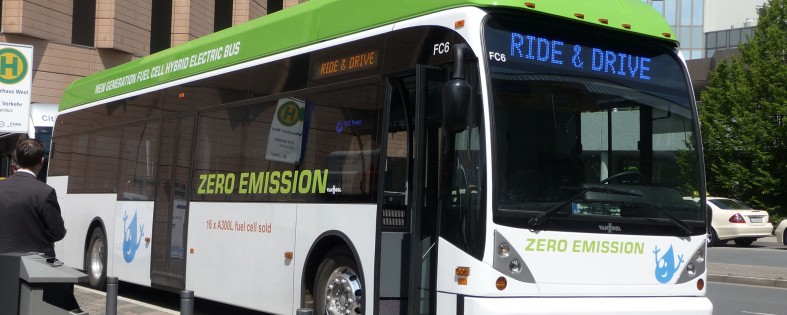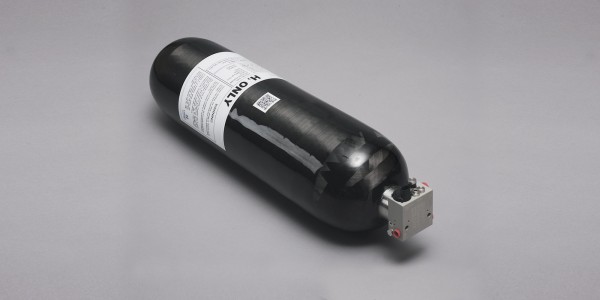US +1800 764 0366 | Europe & Middle East +44 (0)115 980 3800 | Asia-Pacific: +61 2 7227 5369
The Future of Fuel
Hydrogen presents an eco-friendly, regenerative and sustainable energy source and is an ideal replacement for fossil fuels in the transportation sector. Here at Luxfer, we have over 30 years of experience working with the gas. We are continually innovating our cylinder and system technologies and specialise in working with forward-thinking companies to harness the full potential of hydrogen power for bespoke transport projects.
As the world’s largest ISO approved manufacturer of lightweight, high-pressure composite and aluminium cylinders and member of the Fuel Cell & Hydrogen Energy Association (FCHEA) and the UK Hydrogen and Fuel Cell Association (UKHFCA), we have unrivalled industry-leading expertise in designing and supplying hydrogen storage systems.
Environmental concerns have focused research and development efforts on hydrogen as an alternative fuel to power the needs of our daily lives. For example, in electric vehicles, it is used to run fuel cells which convert the gas efficiently into electrical energy.
The UK has pledged a green industrial revolution, creating jobs and infrastructure to achieve net-zero emissions by 2050. With our track record in the hydrogen market, and continued investment in our alternative fuel capability, Luxfer Gas Cylinders are committed to playing a central role.
“With the government’s new environmental vision, hydrogen provides a very attractive alternative to diesel transport and electricity,” commented Dr. Mark Lawday, Luxfer’s head of European sales. “Our recent projects are an excellent example of Luxfer’s commitment to a clean, green economy across the globe.”
As demand increases across a wide range of applications in Europe, the focus on hydrogen as a fuel is clearly shifting away from a niche market into one that is much more accessible and expansive. It’s even influencing an international step-change in the approach to decarbonisation efforts.
At Luxfer, we believe in creating a greener world for future generations, and we’re passionate that hydrogen is the key to safe and sustainable transport. We’re working with a number of commercial vehicle manufacturers around the world to supply industry-leading hydrogen cylinders and, in many cases, to design hydrogen fuel systems to meet the highest technological and safety requirements.

What are the benefits of Luxfer hydrogen systems?
- Lightness of weight from G-Stor H2 carbon composite cylinder technology increases fuel economy and reduces wear and tear.
- Luxfer is ISO 9001 approved and our systems are manufactured in an ECE R110 approved facility.
- Cost-saving – 1 gallon of petrol has about the same amount of energy as 1kg of hydrogen.
- Quiet operation and fewer moving parts decreases noise pollution and gives a smoother ride.
- Zero harmful emissions – when used in a fuel cell, hydrogen produces zero emissions, the only by-product is water vapour.
- Range – similar to conventional petrol vehicles, quick and easy to refill: 1-minute for 1kg of hydrogen = 100 km range.
- Better performance – high torque and high efficiency from electric drive-train.
- Energy conservation – system idles when not in use to preserve energy, a regenerating brake system recycles energy back into the batteries, while an energy storage system provides extra boost for accelerating and tackling inclines.
- Lowers sound pollution – quieter vehicles cut noise in urban areas.

How do hydrogen systems work?
Hydrogen-powered vehicles use fuel cells to convert the chemical energy in the gas (stored under pressure in cylinders) to electrical energy via an electrochemical process – fuel cells do not combust hydrogen, but instead combine it with oxygen in a chemical reaction that produces electricity for power. The only tailpipe emission is water.
This process is extremely efficient – nine litres of water can produce one kilogram of hydrogen. And that kilogram of hydrogen contains about 33 kilowatts of energy which, in the case of a small road vehicle, can power the electric motor and achieve a range of around 100 kilometres.
The efficiency of water electrolysis is between about 70-80%, with a goal set to reach 82-86% efficiency by 2030 using proton exchange membrane (PEM) electrolyzers.
If the energy required to produce the hydrogen gas, in the initial instance, comes from a sustainable or renewable source then the potential is practically unlimited. Of course, in reality hydrogen production is still quite reliant on less green methods, but investment in wind, wave, biomass and solar power, combined with our own internal policies on reducing our alternative fuel system manufacturing footprint and recyclable cylinders, will make great strides towards this. Well-to-wheel emissions of a hydrogen fuel-cell car are nonetheless currently about 30% lower than those of a conventional diesel-powered car.
How does a hydrogen fuel cell work?
Fuel cell systems are a clean, efficient, reliable, quiet and scalable power source. There are no moving parts and they do not need to be recharged like batteries and continue to produce electricity as long as fuel is present.
The cell is made up of an anode, cathode, and an electrolyte membrane. Passing hydrogen through the anode splits the hydrogen molecules into electrons and protons. The protons pass through the membrane, while the electrons go into a circuit, generating the electric current. At the cathode, the hydrogen protons and oxygen combine to produce water.
Further efficiencies are achieved in the vehicle design using techniques such as regenerative braking, idle-stop and onboard batteries to store excess energy.

How is the hydrogen stored?
In cylinders, and as part of custom-built systems. Our G-Stor H2 products are the leading line of lightweight, impermeable, high-pressure carbon composite hydrogen-storage cylinders. They are used by some of the world’s largest OEMs that design, develop and manufacture state-of-the-art compressed hydrogen-storage systems for fuel-cell and internal combustion engines.
The G-Stor H2 is also available with our proprietary high-pressure hydrogen electronic solenoid valve, resulting in a certified, cost-effective hydrogen-storage solution that is ideal for transport applications.
G-Stor H2 cylinders are also being used for mobile refuelling systems that provide “instant infrastructure” by making compressed hydrogen immediately accessible to end-users.
European Business Development Manager, Jim Gregory said, “We have been making high-pressure gas storage for 80 years, and we have been at the forefront of every technological advancement in that time. Over the next two years, our industry is going to see a step-change in the variety of new applications for hydrogen in areas we perhaps did not even think of a few years ago.”
Learn more about G-Stor H2 hydrogen cylinders